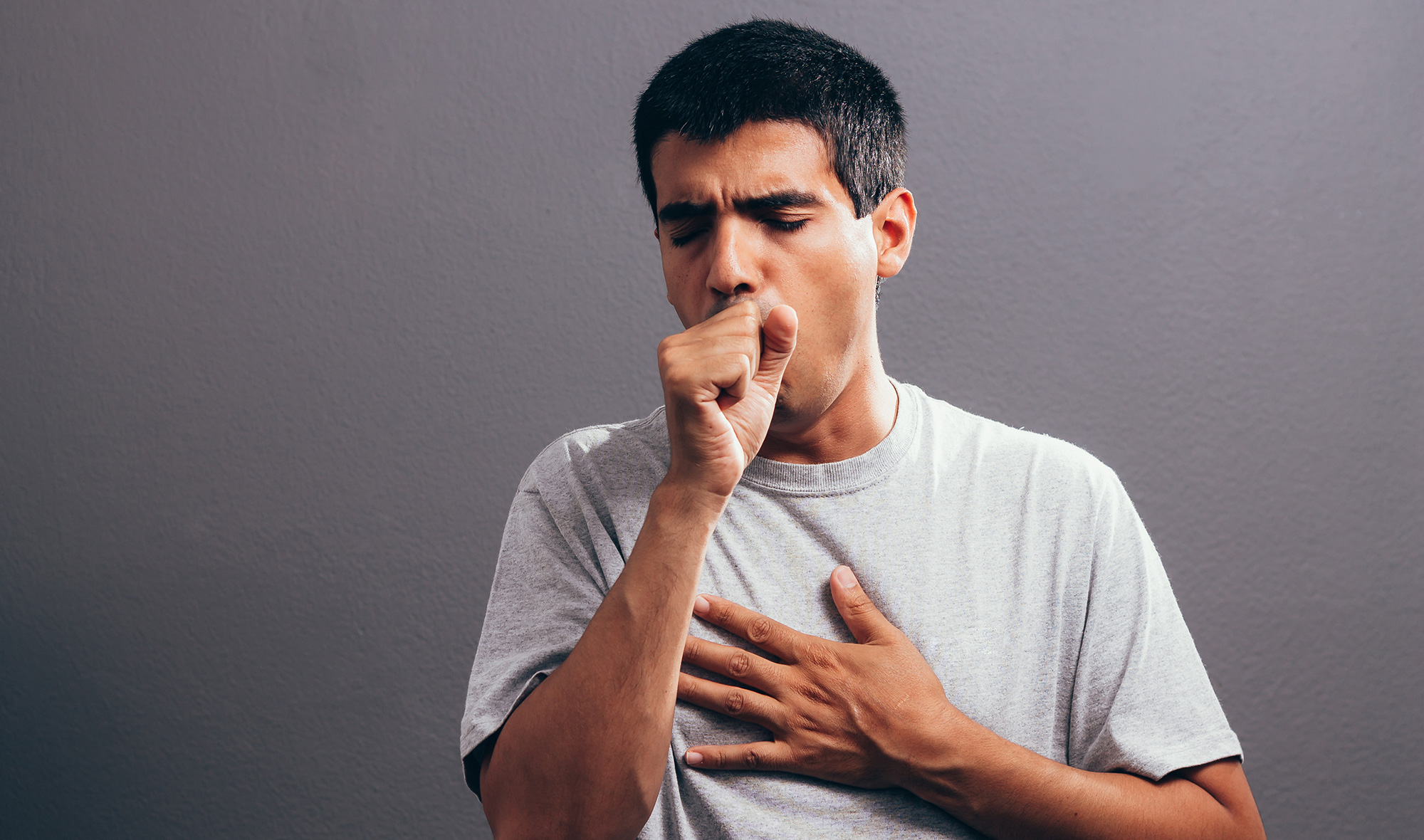What is a cough?
When the cells lining your throat and airways come in contact with a foreign body such as dust, pollen or smoke, messages are sent to the brain and instructions sent back to begin the cough reflex, forcing air out of your lungs under pressure. So, without you making a conscious decision you have just prevented yourself from inhaling a potentially harmful object. A cough can also be triggered by inflammation of the airways as this is perceived by the brain as if there was a foreign body in the way and the cough reflex tries to expel it. You can also initiate a cough voluntarily if there is discomfort in your throat, for example to clear it of mucus or phlegm, keeping the throat and upper airways clear.
What causes coughs?
A persistent cough means there is a source of irritation that has not been cleared and usually indicates that either you have an infection or a respiratory problem. The cause of a cough depends on how long you have had it and whether it is dry and tickly or chesty and productive (coughing up mucus or phlegm). Most causes are not serious and easily resolved, but a persistent or chronic cough can indicate a more serious problem and should not be ignored.
1. Infection
Most infections of the throat and upper airways are caused by a virus, such as the common cold or flu, while irritation triggers a dry tickly cough; anything coughed up is clear or pale yellow. More serious infections that affect the lower airways and the lungs include pneumonia (viral or bacterial) and whooping cough (bacterial) whereby coughing is caused by the need to bring up mucus which may be thick and coloured from the lungs. Croup, which occurs in young children, is caused by narrowing of the larynx (voice box) area with a cold and produces a dry, barking cough, and a similar noise on breathing (sometimes accompanied by difficulty breathing). Bronchiolitis only develops in babies and is a viral infection (cold) causing a dry rasping cough, with wheezing and breathing difficulties.
2. Bronchitis
Bronchitis is an inflammation of the membrane lining the bronchi or large airways of the lung, which responds by producing a mucus which may be thick and coloured and triggers a chesty cough to bring up this mucus. Bronchitis can be the result of an infection (bacterial or viral), asthma, or as a result of smoking.
3. Asthma and allergy
Asthma is a narrowing of the small airways of the lungs (bronchioles) and coughing is a common symptom. An asthmatic cough is usually worse at night or when breathing cold air; it is usually accompanied by fast noisy breathing or wheezing. Asthma is most commonly triggered by a cold or an allergic reaction to pollen, animal fur and airborne factors like smoke.
4. Smoking
Cigarette smoke destroys various parts of the lung, including the air sacs and the small hairs that move mucus up your airways. This damage is permanent and leads to serious life-threatening conditions like chronic bronchitis, emphysema and lung cancer.
5. Medication
Some medicines produce a cough as a side-effect, such as ACE inhibitors and beta-blockers, commonly prescribed for high blood pressure and congestive heart failure.
6. Medical conditions
Some medical conditions associated with a chronic cough include:
- Gastro-oesophageal reflux – where stomach acids travel up the oesophagus into the throat causing irritation and triggering the cough reflex, usually causing nightime coughing.
- Chronic Obstructive Pulmonary Disease (COPD) – where the air sacs of the lung are damaged and fill with mucus which is continually expelled by a chronic cough. Chronic bronchitis and emphysema are two types of COPD.
- Lung cancer – causes a cough by various mechanisms and may result in the coughing up of blood-stained mucus.
Prevention and treatment
Because there are so many different causes for a cough, it is important to identify what is causing the cough and then seek the appropriate treatment.
1. Identify the cause of the cough
- Other symptoms that you have along with the cough will help identify its cause. A sore throat, headache, sinus pressure or fever indicates an infection, probably viral.
- Breathing difficulties may indicate asthma or an allergy.
- Coughing up blood is an indication of a more serious problem.
- How long you have had the cough and whether it’s related to recent exposure to something will help identify an allergy or other irritant (chemical).
2. Avoid known causes
If you smoke, stop now as this indicates the damage you are doing to your lungs.
If you have asthma or allergies, make sure you have your asthma well controlled and avoid contact with anything you are allergic to. Avoiding contact with anyone who has a cold or flu will reduce your chance of catching these viral infections.
3. Self-care
If your cough is not serious and you are not in need of medication or medical care, the best you can do is make sure you drink plenty of fluids to prevent it. If you have a headache you can take mild analgesia like paracetamol or aspirin. Keeping the room humidified or inhaling steam may help with breathing. Use of throat lozenges or vapour rubs using menthol or eucalyptus may also help, especially if you have a blocked nose.
4. When to seek medical care
If you suspect that a cough is serious, eg. you are short of breath, wheezy or coughing up blood, you should contact your GP for medical help and advice, which may be provided in the way of:
- An inhaler or bronchodilator (for asthma) to help open airways.
- Prescribed medicine, such as an antibiotic.
- Chest X-ray or other investigations.
5. Medication
Over-the-counter medicines include:
- Cough suppressants – should only be used to relieve a dry hacking cough often associated with a cold or the flu. They should not be used to suppress a productive cough as the mucus needs to be brought up to prevent it accumulating and blocking the airways. They should not be used in children.
- Antihistamines – may help if you have an allergic problem.
- Decongestant nasal sprays – these reduce the swelling and help you breathe better through your nose but should be used only for short-term no more than five days.
- For prescribed medicines you will need to visit your doctor.
- Antibiotics – will only be prescribed if you have a bacterial infection as they do not have any effect on viruses.

















Community